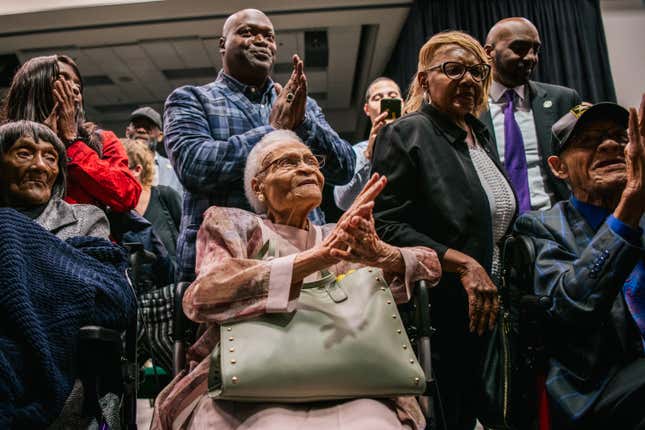
History books are notorious for leaving out information, especially about racism in America. Have you ever heard of Black Wall Street? Or were you ever taught in school about the Tulsa Massacre of 1921?
Although there have been pop culture efforts to highlight this tragedy in shows like The Watchmen starring Regina King and Lovecraft Country with Michael K Williams, it’s clear that the majority of Americans are still clueless about one of the most defining events of the 20th century.
1921 was not that long ago. Today, there are only two known survivors from the Tulsa Massacre, and they have just been denied reparations.
Last Wednesday, the Oklahoma Supreme Court refused to grant trial to Lessie Benningfield Randle, 108, and Viola Fletcher, 109. This comes four years after the original reparations suit, filed by Randle, Fletcher, and Hughes Van Ellies, who died at age 102 in 2023.
Under the state’s Nuisance Law, the trio argued that the bloody massacre of 1921 still affects their lives and impacts the Tulsa community to this day.
The Greenwood neighborhood in Tulsa was coined “Black Wall Street” for its thriving Black population and community. There, Black Americans from across the country would come to visit Greenwood’s booming scene.
On May 31, 1921, those businesses were destroyed, houses were burned down, and an estimated 300 Black men, women, and children were killed by a white mob, according to History.com. Randle, Fletcher, and Ellies were only children when it happened, but they still remember that night.
“I still see Black men being shot, Black bodies lying in the street. I still smell smoke and fire,” Fletcher told the House committee in her 2021 testimony.
With the burning of the affluent Black Wall Street, children like Fletcher lost their chance to proper education and sense of community. Fletcher said she never advanced past the fourth grade.
The damage of the riot did not end in 1921. Randle’s family never bounced back financially from the massacre, and in 1980, she was forced out her family home due to ongoing urban developments, according Justice for Greenwood, an organization advocating for survivors and descendants of the massacre.
The detailed testimonies from the survivors and the well documented history of the event were not enough for the state’s Supreme Court to grant a fair trial.
“Though plaintiffs’ grievances are legitimate, they do not fall within the scope of our State’s public nuisance statute,” said the Court.
Many fear this was the last chance for the survivors to truly get some form of justice for what they’ve endured, but that doesn’t mean the fight is over yet.
In 2020, a bill was introduced which aimed to nationally recognize the centennial anniversary of the massacre in 2021. Although the resolution was never passed, this marked the first time in American history that Tulsa was acknowledged as a racial war ground.
President Biden also visited Tulsa in 2021 and spoke at the ceremony marking 100 years since 1921.
In 2024, there remains efforts to acknowledge this tragedy and right the wrongs of the past. Currently, the Senate is deciding on a bipartisan bill which would recognize the Greenwood neighborhood as a National Monument.
With support from New Jersey Sen. Cory Booker and Oklahoma Sen. James Lankford, the bill will “illuminate the incredible legacy of Black excellence and commemorate those who perished during the 1921 Tulsa Race Massacre,” according to the Historic Greenwood District Black Wall Street National Monument Coalition.
For more information about the coalition’s efforts, visit the official website here.

